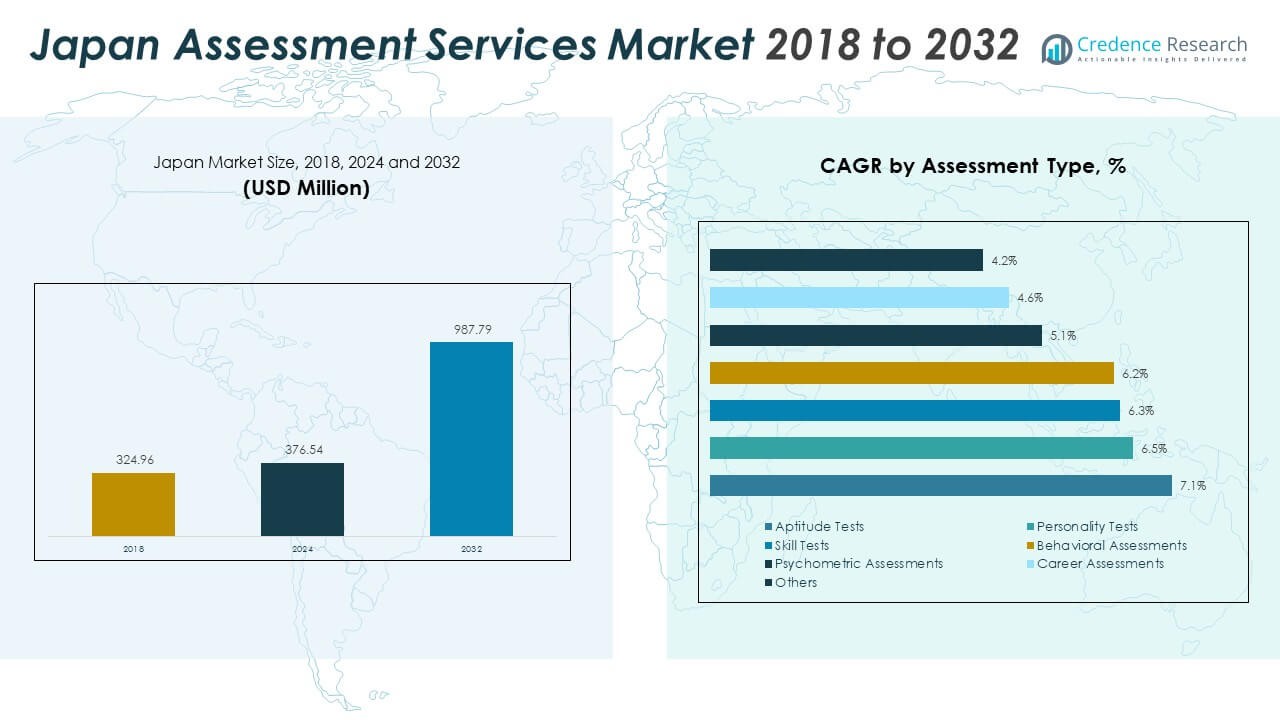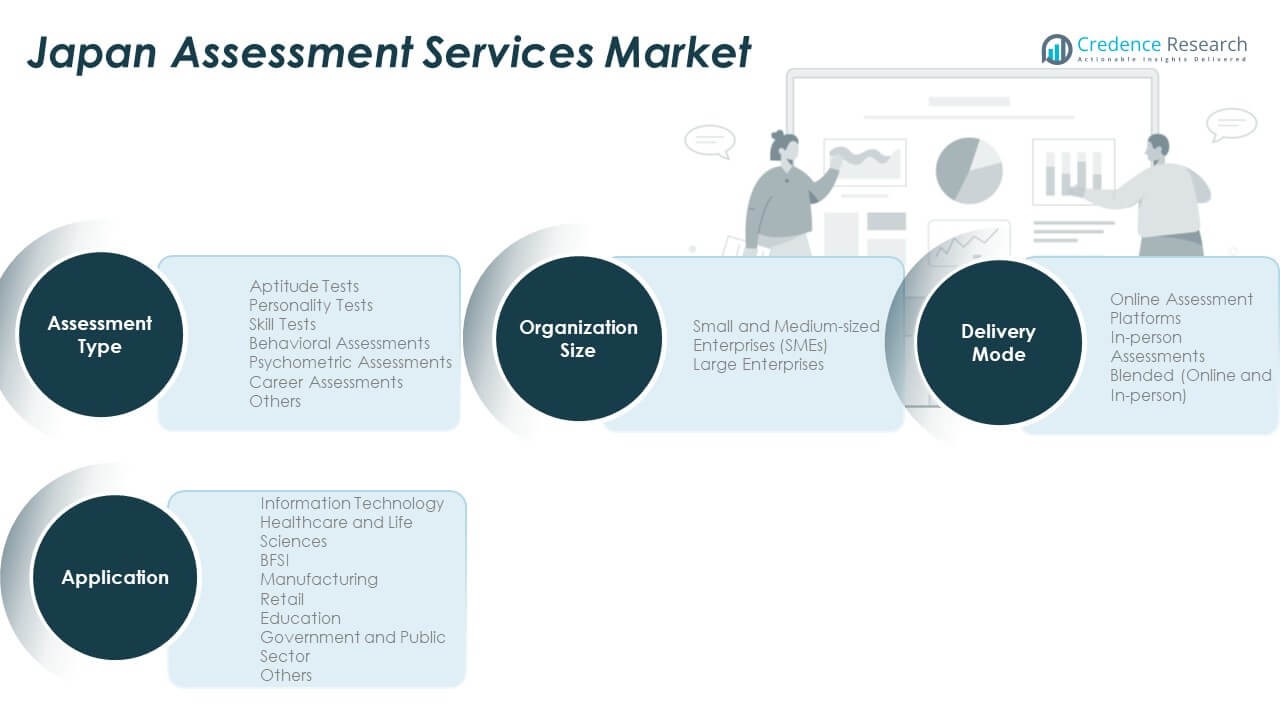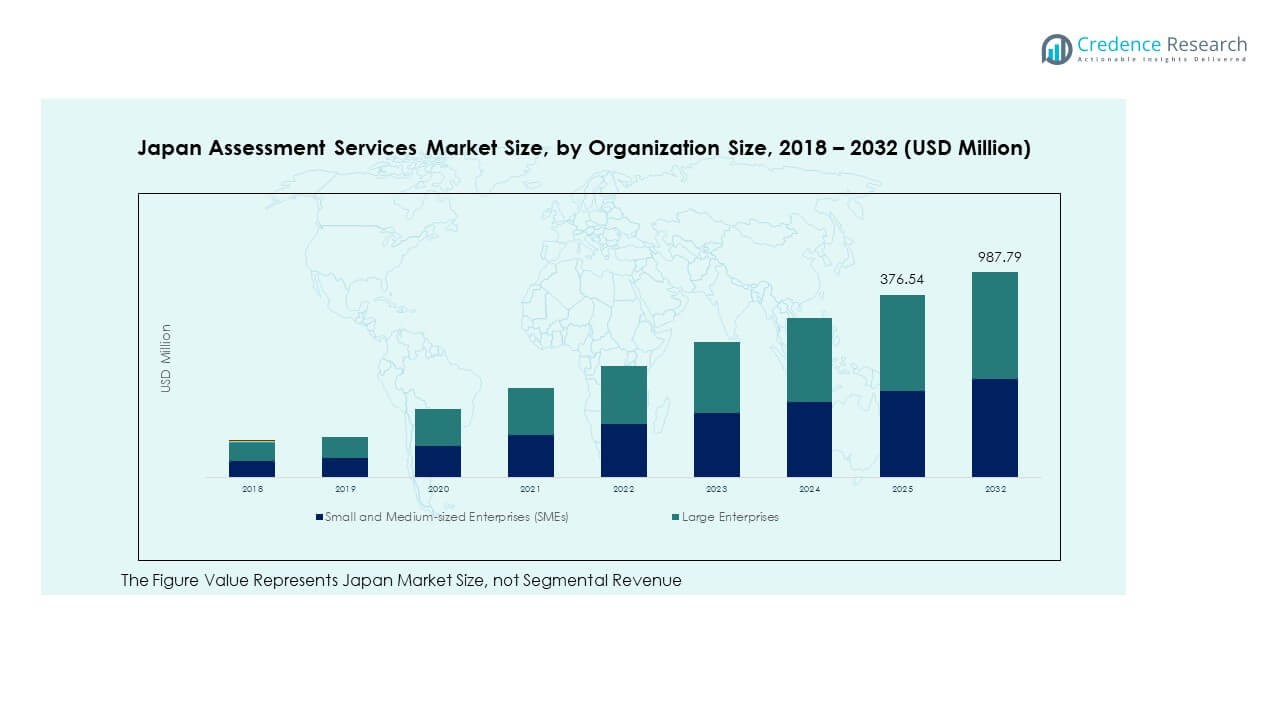Market Overview:
The Japan Assessment Services Market size was valued at USD 324.96 million in 2018 to USD 376.54 million in 2024 and is anticipated to reach USD 987.79 million by 2032, at a CAGR of 12.81% during the forecast period.
| REPORT ATTRIBUTE |
DETAILS |
| Historical Period |
2020-2023 |
| Base Year |
2024 |
| Forecast Period |
2025-2032 |
| Japan Assessment Services Market Size 2024 |
USD 376.54 Million |
| Japan Assessment Services Market, CAGR |
12.81% |
| Japan Assessment Services Market Size 2032 |
USD 987.79 Million |
Growing emphasis on skills-based hiring, digital learning, and certification programs drives strong demand across industries. Organizations are investing in AI-enabled assessment platforms that support remote testing and real-time performance analytics. Expanding corporate learning initiatives, government-led education reforms, and the need for workforce upskilling further contribute to market expansion. The increasing adoption of online assessments in schools and universities enhances reliability and scalability, ensuring wider market reach.
Regionally, major metropolitan areas such as Tokyo, Osaka, and Yokohama lead due to strong digital infrastructure and the presence of major technology firms. Educational institutions and corporates in these regions are early adopters of digital assessment solutions. Emerging regions, including Hokkaido and Kyushu, are gradually expanding their adoption, supported by improving broadband connectivity and government investments in e-learning and remote education solutions.
Access crucial information at unmatched prices!
Request your sample report today & start making informed decisions powered by Credence Research Inc.!
Download Sample
Market Insights:
- The Japan Assessment Services Market was valued at USD 324.96 million in 2018, reached USD 376.54 million in 2024, and is expected to attain USD 987.79 million by 2032, registering a CAGR of 12.81% during the forecast period.
- The Kanto region leads with 42% share due to its strong corporate base and digital infrastructure, followed by Kansai at 28% and Chubu at 18%, both driven by manufacturing, education, and financial institutions adopting AI-based assessments.
- Kyushu and Hokkaido, with a combined 12% share, represent the fastest-growing regions supported by expanding broadband connectivity and rising adoption of remote learning platforms.
- Large enterprises account for nearly 60% of the market share in 2024, driven by established HR systems, structured workforce assessments, and digital readiness.
- SMEs contribute around 40%, with rapid adoption of cloud-based, cost-efficient assessment solutions enhancing accessibility and competitiveness across industries.

Market Drivers:
Rising Focus on Skill-Based Hiring and Workforce Competency Evaluation
The Japan Assessment Services Market is expanding due to the growing shift toward skills-based recruitment and employee development. Companies are prioritizing competency evaluation over traditional qualification-based hiring to enhance productivity. This approach helps organizations identify the right talent, reduce turnover, and align employee skills with business objectives. Corporate HR departments increasingly adopt digital assessment tools to measure technical, cognitive, and behavioral capabilities. The rise of hybrid work models further supports the use of online assessments for remote hiring. Government programs promoting lifelong learning and reskilling amplify this demand. The growing emphasis on merit-driven performance evaluation sustains the market’s long-term growth momentum.
- For instance, the Hays Japan 2025 Talent Trends report confirms that 72% of organizations are integrating skill-based models into recruitment while 42% provide AI-related training to address workforce gaps, in line with Lightcast’s April 2025 analysis applying skills taxonomy to Japan’s labor market—marking the first time international taxonomy data was used to map over 20,000 Japanese job roles.
Integration of Artificial Intelligence and Automation in Assessment Tools
Technological adoption strongly influences market development through AI and automation integration. AI-driven assessments offer precision, scalability, and data-backed insights that improve hiring decisions. These tools enhance fairness by minimizing human bias and ensuring standardized evaluation criteria. The integration of predictive analytics allows organizations to map potential employee performance more accurately. Automation simplifies assessment administration and scoring, reducing time and operational costs. Educational institutions also adopt AI platforms to evaluate student learning outcomes. This technological convergence strengthens the market’s efficiency and reliability.
- For instance, Mercer | Mettl’s Artificial Intelligence Engineer Assessment provides a 40-question, 60-minute AI test used globally to gauge NLP, ML, and data-mining skills, generating real-time analytics on candidate performance, while its remote proctoring system has achieved a 95% cheating detection accuracy rate during mass digital testing deployments
Government Support for Education Modernization and Workforce Upskilling
Japan’s government plays a critical role in advancing digital learning and assessment ecosystems. National education reforms focus on competency-based evaluation and skill development initiatives. The Ministry of Education promotes digital platforms for testing and certification to improve transparency and standardization. Workforce reskilling policies encourage companies to invest in employee learning assessments. It benefits industries facing skill shortages, particularly in IT, manufacturing, and healthcare. Public-private collaborations increase access to online testing tools in rural areas. This policy-driven momentum builds a sustainable foundation for continuous learning and evaluation.
Expansion of Corporate Training and Certification Ecosystems
The corporate sector drives significant growth through expanded investment in training and certification programs. Businesses recognize the value of assessment services in tracking employee performance and compliance. Learning management systems integrated with testing modules offer a unified skill evaluation environment. Organizations use continuous assessments to ensure workforce readiness for technological transformation. Large enterprises collaborate with service providers to design customized certification programs. Start-ups and SMEs also adopt low-cost cloud-based assessment solutions to maintain competitiveness. The growing corporate preference for performance metrics enhances the sector’s adoption rate.
Market Trends:
Growing Adoption of Remote and Online Assessment Platforms
The shift toward remote operations has accelerated the adoption of digital testing platforms. Companies and educational institutions now prioritize cloud-based systems for flexibility and accessibility. Secure proctoring technologies enable reliable evaluations from any location. It improves participation rates and ensures fair testing under supervised conditions. The increasing reliance on online assessments supports efficient large-scale testing. Japan’s advanced internet infrastructure enhances this trend’s viability. The convenience and reduced logistical cost make remote testing an enduring market pattern.
- For instance, in 2025, Japan’s Ministry of Economy, Trade and Industry (METI) supported the “METI AI & Tech Talent Program,” a fully-funded internship providing hands-on AI engineering and tech experience to international students. Simultaneously, the Ministry of Education (MEXT) announced new mandatory AI education for K-12 students, with teacher training programs and curriculum development supported by universities and tech firms.
Emergence of Data-Driven and Personalized Assessment Solutions
The market shows strong movement toward personalized assessments backed by data analytics. Institutions and employers use analytics to track learning progress and identify knowledge gaps. Adaptive testing mechanisms adjust question difficulty based on performance, improving accuracy. This trend enhances both user engagement and test credibility. Predictive performance analytics help in forecasting training needs and employee growth paths. Data-driven insights guide curriculum design in schools and training programs in enterprises. This personalization trend aligns with Japan’s pursuit of precision and efficiency in evaluation systems.
Rising Demand for Language Proficiency and Cognitive Ability Assessments
Language and cognitive assessment services are becoming critical across educational and corporate sectors. Globalization increases demand for English proficiency and communication skill evaluation. Companies operating internationally require multilingual teams capable of cross-cultural collaboration. Educational institutions also integrate cognitive testing to enhance student evaluation beyond academics. AI-enabled language assessments improve speed, accuracy, and adaptability. This demand aligns with Japan’s evolving workforce that seeks global employability. The trend fosters steady growth for specialized testing service providers.
Integration of Virtual Reality (VR) and Simulation-Based Testing Methods
Innovative assessment formats using VR and simulations are reshaping evaluation experiences. These technologies create immersive environments to test real-world decision-making and technical skills. Industries such as healthcare, aviation, and engineering lead in adopting these solutions. Simulation-based testing improves engagement and practical understanding. It bridges the gap between theoretical learning and operational application. VR assessments also help reduce risk and training costs. The trend underscores Japan’s focus on experiential learning and precision testing in complex work scenarios.
Market Challenges Analysis:
Data Privacy Concerns and Limited Standardization in Assessment Systems
The Japan Assessment Services Market faces challenges due to rising data privacy concerns and lack of uniform standards. Online testing platforms process vast amounts of personal and performance data, increasing vulnerability to breaches. Strict national data protection laws require compliance measures that can limit platform flexibility. Limited standardization across testing methods creates inconsistencies in result interpretation. Variations in grading frameworks among institutions weaken cross-comparability of results. Service providers must balance customization with regulatory adherence. Maintaining integrity and fairness under digital transformation adds operational pressure. These challenges restrict scalability for smaller players lacking compliance infrastructure.
Resistance to Technological Adoption and Infrastructure Disparities
Slow adoption of advanced digital tools poses another barrier to growth. Some educational institutions and small organizations still rely on traditional paper-based evaluations. High implementation costs discourage rapid modernization in less-funded sectors. Infrastructure disparities, especially in remote regions, delay uniform digital adoption. Limited technical training among educators and HR teams reduces effective platform utilization. Concerns over test authenticity and online cheating hinder full digital transition. Vendors must invest in awareness programs to overcome hesitation. These resistance factors slow down transformation and reduce the market’s penetration rate.

Market Opportunities:
Expansion of Cloud-Based Platforms and Cross-Sector Digitalization
Cloud-based solutions present strong opportunities for scalable assessment operations across industries. Service providers can deliver flexible, subscription-based platforms that reduce upfront costs. Integration with HR software, e-learning portals, and analytics tools enhances user experience. The Japan Assessment Services Market benefits from growing digital adoption in education and corporate training. Cloud integration supports real-time analytics, remote testing, and easy data management. This expansion opportunity enables companies to reach untapped regional and SME segments.
Rising Demand for Continuous Learning and Professional Certification Programs
The market holds potential in continuous education and industry certification programs. Employers seek assessment systems that align with evolving professional standards. Collaborations between training institutes and corporates promote structured skill validation. The trend toward lifelong learning encourages wider use of standardized assessment tools. Certification-based evaluation ensures consistent skill recognition across sectors. This opportunity strengthens the market’s long-term sustainability by linking education and workforce development.
Market Segmentation Analysis:
By Assessment Type
The Japan Assessment Services Market is segmented into aptitude tests, personality tests, skill tests, behavioural assessments, psychometric assessments, career assessments, and others. Aptitude and skill tests dominate due to their extensive use in recruitment and academic evaluations. Personality and behavioural assessments are gaining traction across corporate sectors to evaluate employee fit and leadership potential. Psychometric and career assessments support education institutes and training programs focused on career guidance. The growing preference for digital testing tools enhances accuracy, scalability, and adaptability across assessment types.
- For instance, according to Japan’s 2025 employment reports, more than 85% of companies incorporate SPI (Synthetic Personality Inventory) aptitude tests in recruitment; Recruit Holdings administers over a million SPI-based evaluations annually to assess candidate reasoning and personality fit outcomes.
By Application
The market spans applications in information organization size, healthcare and life sciences, BFSI, manufacturing, retail, education, government and public sector, and others. Education and corporate sectors lead due to rising adoption of standardized testing for performance evaluation. BFSI and manufacturing industries utilize assessments for compliance training and employee onboarding. Healthcare and public sectors are adopting data-driven evaluations to improve workforce quality and accountability.
- For instance, in April 2025, FPT Software partnered with Sumitomo Corporation and SBI Holdings to launch AI workforce development through FPT Smart Cloud Japan, with each partner holding a 20% stake, targeting large-scale AI adoption across Japanese institutions, while Fujitsu rolled out its Employee Success Platform to digitally train 21,000 Seven‑Eleven Japan stores with real-time feedback analytics.
By Organization Size
Based on organization size, the market includes small and medium-sized enterprises (SMEs) and large enterprises. Large enterprises account for a major share due to structured HR systems and digital readiness. SMEs are rapidly increasing adoption through cost-effective cloud-based platforms that support recruitment and training needs.
By Delivery Mode
The delivery mode segment includes online assessment platforms, in-person assessments, and blended formats. Online platforms dominate due to convenience, automation, and remote accessibility. Blended models are growing in corporate learning environments combining digital tools with physical evaluations.

Segmentation:
By Assessment Type
- Aptitude Tests
- Personality Tests
- Skill Tests
- Behavioural Assessments
- Psychometric Assessments
- Career Assessments
- Others
By Application
- Information Organization Size
- Healthcare and Life Sciences
- BFSI (Banking, Financial Services, and Insurance)
- Manufacturing
- Retail
- Education
- Government and Public Sector
- Others
By Organization Size
- Small and Medium-sized Enterprises (SMEs)
- Large Enterprises
By Delivery Mode
- Online Assessment Platforms
- In-person Assessments
- Blended (Online and In-person)
Regional Analysis:
Dominance of Kanto Region in Market Share
The Kanto region leads the Japan Assessment Services Market with a market share of around 42%, supported by its dense concentration of corporate headquarters, universities, and technology companies. Tokyo serves as the central hub for assessment service providers due to its advanced digital infrastructure and skilled workforce. The region’s corporate sector actively integrates AI-driven testing platforms for recruitment and performance evaluation. Educational institutions in Tokyo and Yokohama also use digital assessments to enhance transparency in grading and entrance examinations. The growing number of multinational companies and start-ups in Kanto sustains consistent demand for online and psychometric assessments. Its well-established service ecosystem enables faster technology adoption and scalability across sectors.
Strong Growth in Kansai and Chubu Regions
The Kansai region holds a market share of about 28%, driven by industrial clusters in Osaka, Kyoto, and Kobe. These cities host manufacturing and financial institutions that use assessment tools for skill validation and workforce optimization. The Chubu region, accounting for nearly 18%, shows robust growth due to rising investment in education technology and corporate training. Companies in both regions deploy customized assessment platforms to support employee evaluation and leadership programs. Universities in Kansai also collaborate with technology vendors to integrate adaptive learning and testing software. These regions benefit from government incentives promoting digital transformation in human capital management.
Emerging Potential in Kyushu and Hokkaido Regions
Kyushu and Hokkaido collectively capture an estimated 12% market share and are emerging as promising regions. Growing internet connectivity and increased government investment in e-learning infrastructure strengthen local adoption of assessment tools. Universities and regional training centers in these areas implement remote testing systems to improve accessibility and standardization. Companies in logistics, tourism, and public administration are adopting digital platforms for staff assessment and certification. It benefits from national education policies promoting online evaluation and upskilling initiatives. Continuous infrastructure upgrades and the expansion of cloud-based services are expected to drive sustained growth in these developing regions.
Shape Your Report to Specific Countries or Regions & Enjoy 30% Off!
Key Player Analysis:
Competitive Analysis:
The Japan Assessment Services Market features moderate competition with several established global and domestic players. Leading companies such as Mercer | Mettl, Prometric, Thomas International, and EdulinX Corporation dominate due to advanced assessment technologies and strong institutional partnerships. Local firms like SHIFT Inc. and HRMOS (BizReach) strengthen competition through AI-based solutions and localized content. The market’s competitive landscape is defined by innovation, data security, and service customization. It is witnessing growing collaboration between educational institutes and corporates to create scalable digital platforms. Continuous investment in automation and analytics ensures differentiation and sustained market presence.
Recent Developments:
- In October 2025, SHIFT Inc. announced a major organizational restructuring involving an absorption-type company split with its consolidated subsidiary Airitech Inc., set to take effect December 1, 2025. This move aims to strengthen collaboration in system performance verification, big data, AI utilization, and web application development, aligned with the company’s growth targets.
Report Coverage:
The research report offers an in-depth analysis based on Assessment Type, Application, Organization Size, and Delivery Mode. It details leading market players, providing an overview of their business, product offerings, investments, revenue streams, and key applications. Additionally, the report includes insights into the competitive environment, SWOT analysis, current market trends, as well as the primary drivers and constraints. Furthermore, it discusses various factors that have driven market expansion in recent years. The report also explores market dynamics, regulatory scenarios, and technological advancements that are shaping the industry. It assesses the impact of external factors and global economic changes on market growth. Lastly, it provides strategic recommendations for new entrants and established companies to navigate the complexities of the market.
Future Outlook:
- Rising digital transformation in education and recruitment will sustain strong adoption of assessment tools.
- AI-based adaptive testing and analytics will enhance precision and fairness in evaluation.
- Online assessment platforms will remain the preferred delivery mode across sectors.
- Increased corporate focus on skill-based hiring will drive market expansion.
- Collaborations between global and local vendors will strengthen technology integration.
- Cloud deployment will improve scalability and reduce operational costs for users.
- Government support for digital learning will expand adoption in public institutions.
- Data protection and compliance measures will shape platform development strategies.
- Personalized and gamified assessments will enhance user engagement and experience.
- Continuous upskilling needs in industries will ensure consistent demand growth.






